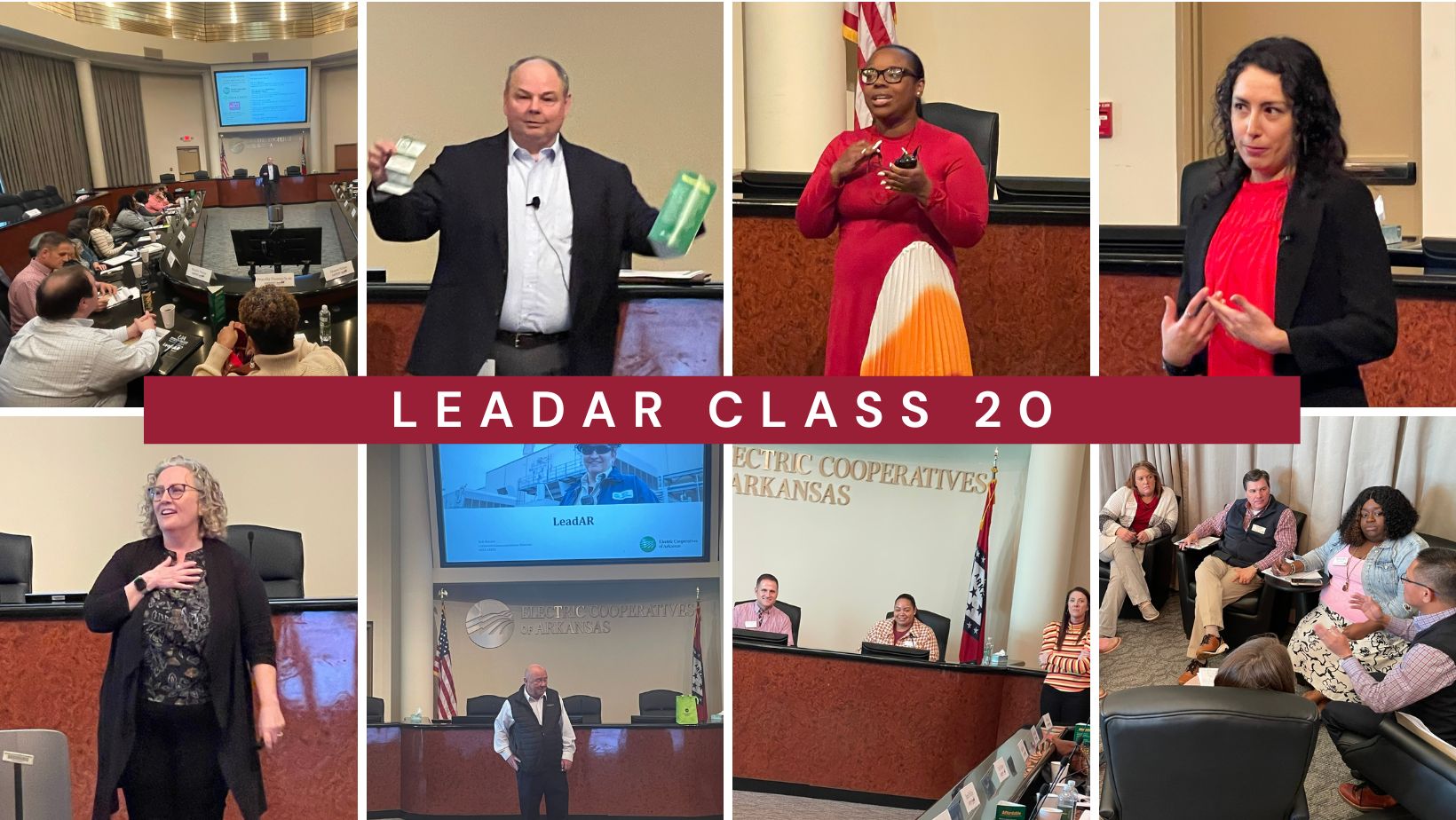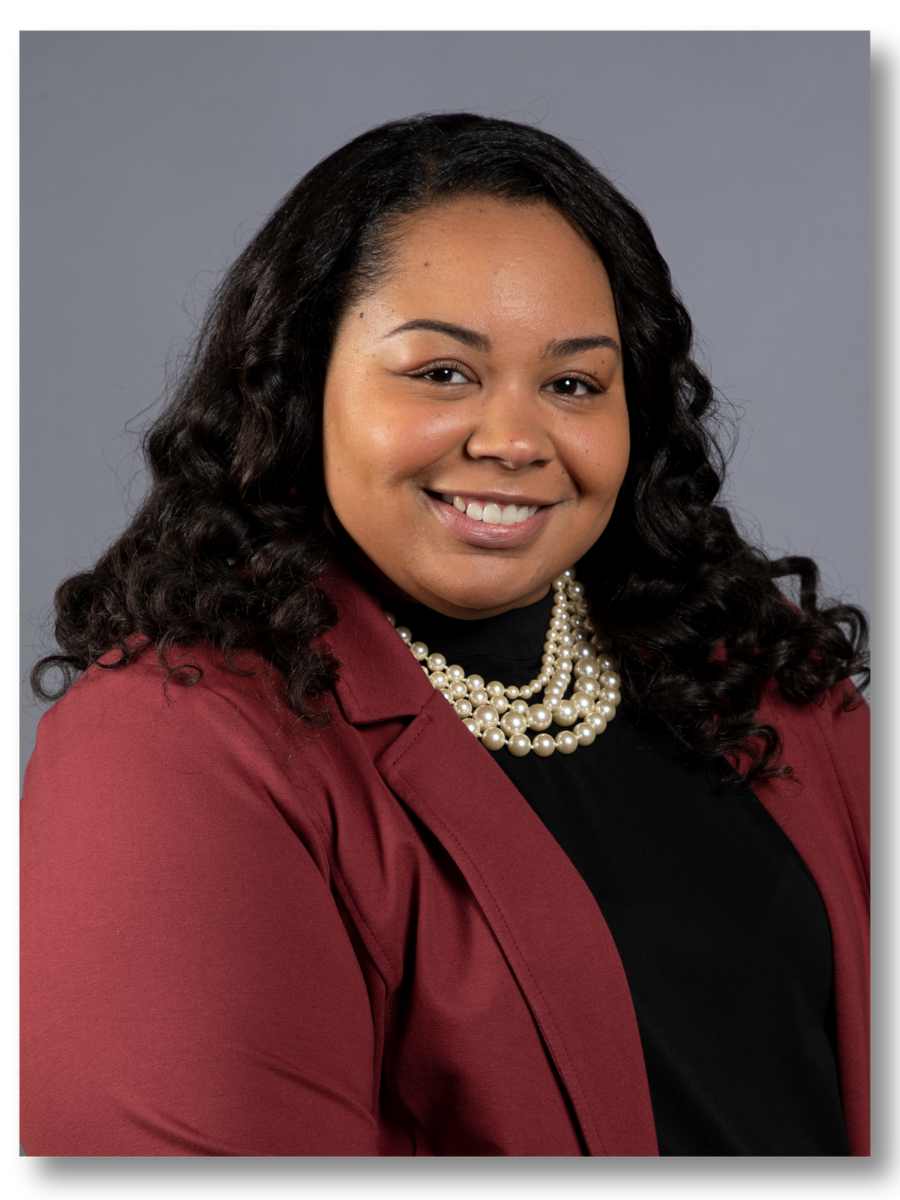Posts
Contact
Lisa Davis
Program Associate-Leadership
Phone: 501-671-2260
Email: ldavis@uada.edu
University of Arkansas System Division of Agriculture
Cooperative Extension Service
2301 S. University Avenue
Little Rock, AR 72204
LeadAR Class 20-Policy and Media Seminar Day One


Day One
On Jan. 25, 2024, LeadAR Class 20 had the privilege of participating in a Public Policy and Media session. During this session, participants spent the day at the Arkansas Electric Cooperative Corporation (AECC) in Little Rock.
We were greeted and welcomed by Rob Roedel, AECC's manager of corporate communications, and Buddy Hasten, AECC's president and CEO. Hasten shared the history of electric cooperatives with us and relayed the mission and core values that all employees standby. He mentioned that the mission statement was about being “reliable, affordable, and responsible” in providing quality services to customers. The core values include: safety, employees (value people), families, integrity, and financial responsibility. It was interesting to learn how they incorporate those core values into various aspects of their daily routines from notebooks, pocket guides, and other items.
We learned that there are more than 6,000 employees, 17 cooperatives, and 14 of those are doing fiber internet services. More than 1.2 million Arkansans are served by electric cooperatives. The areas in which the cooperatives were formed were because of the areas that Arkansas Power and Light (AP&L) refused to serve originally. Nationwide, there are 941 cooperatives. The cooperatives hold a special place in my heart because my mother, Frances Eason-Nelson, served as the first African American and first female Board of Director for South Central Electric Cooperative and she achieved Director Gold status along with serving for over 20 years. She also served on the Arkansas Electric Cooperatives, Inc. and AECC Boards of Directors.
Arkansas Rep. Jamie Scott met with us to share her experience as a legislator for the state. She represents District 72 in the 92nd General Assembly of Arkansas, and she is an alum of LeadAR Class 17. She shared with us her humble beginnings in public service as a legislator. She mentioned that she started out by volunteering for former Sen. Joyce Elliot’s campaign and that was the largest win margin the senator ever had. She then began her own business as a consultant. She served in Hillary Clinton’s presidential campaign and was stationed in Iowa which made her really begin to find her niche in politics. She motivated all of us to take an interest in serving our communities and the state in public service roles and stressed the importance of having good people in line to accept elected offices in the future. She mentioned how important her faith is in her daily life as she works to improve the lives of Arkansans. She also highlighted the importance of building relationships as it relates to positive civil discourse in order to have bipartisan support.
We had the opportunity to hear first-hand what it is like to be a lobbyist in a panel discussion. The panel consisted of Michelle Kitchens (Class 13), Stephanie Malone (Class 18), and Amanda Story. They spoke about the important role lobbyists play in our legislative process by being one of the main resources our representatives use to understand the major points in bills being voted on in the senate. They also discussed how they handle the fast-paced environment during sessions and how to access representatives to get information to them before voting procedures begin.
Roedel spoke with us again about how to develop media interview strategies. He shared information about how big of an impact the media and social media have on industry and the current culture we have today. He shared techniques on how to properly respond to media questions such as never restating a reporter’s question in order to ensure it is not interpreted as an admission or formal statement on an issue, and how to build relationships with local media outlets and representatives to have positive light shared on news stories.
Arkansas Advocate Reporter Antoinette Grajeda joined us and shared insight into how reporters conduct interviews and how they have a code of ethics to follow in order to get factual information for their stories. She spoke about how reporters find stories and conduct interviews.
Dr. Debbie Nistler, assistant associate vice president- 4H and Youth Development, for the University of Arkansas System Division of Agriculture's Cooperative Extension Service, taught us about positive civil dialogue and how important it is to be able to truly listen to others while being present in conversations. We completed an exercise where we made statements about something we were passionate about and then were placed in small groups to discuss those statements and conducted research on them in order to have civil discussions. This taught us how to be passionate about things we value while still having the ability to respect others opinions.
Former Rep. Stephanie Malone presented information on parliamentary procedure in order to prepare us for our legislative meetings the following day. We learned the procedure for conducting a committee meeting, and I practiced being Education Committee Chair. This was very informative and had a major impact on our ability to conduct our committee meetings and present our bills.
Our day wrapped up with a wonderful dinner on the Riley Family Farm, hosted by Tom and Judy Riley (LeadAR Alum Class 1 and 14 respectively) where they showered us with stories about their experiences while in LeadAR and delicious menu items from their farm. It was a great evening filled with laughter and networking with other alum in their beautiful home.
This session was one of my favorites thus far while in the program. The information inspired me to take a greater interest in policies and legislation for our state. I was not only impressed by our guest speakers, but more so by my classmates. Hearing their bills and discussing how different legislation is impacting our state was very eye opening, and I think that we have a few policy makers in the near future who will be LeadAR Class 20 alumni.
LeadAR is a program designed to help Arkansans broaden their understanding of issues and opportunities facing our state and strengthen their ability to make a difference. For more information about LeadAR, visit the website or contact Robinson, jrobinson@uada.edu, or Lisa Davis, ldavis@uada.edu.